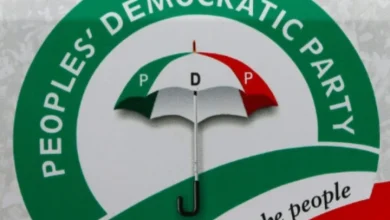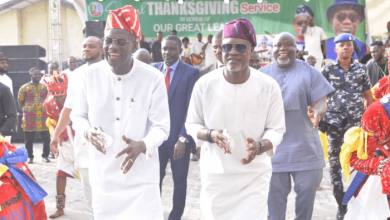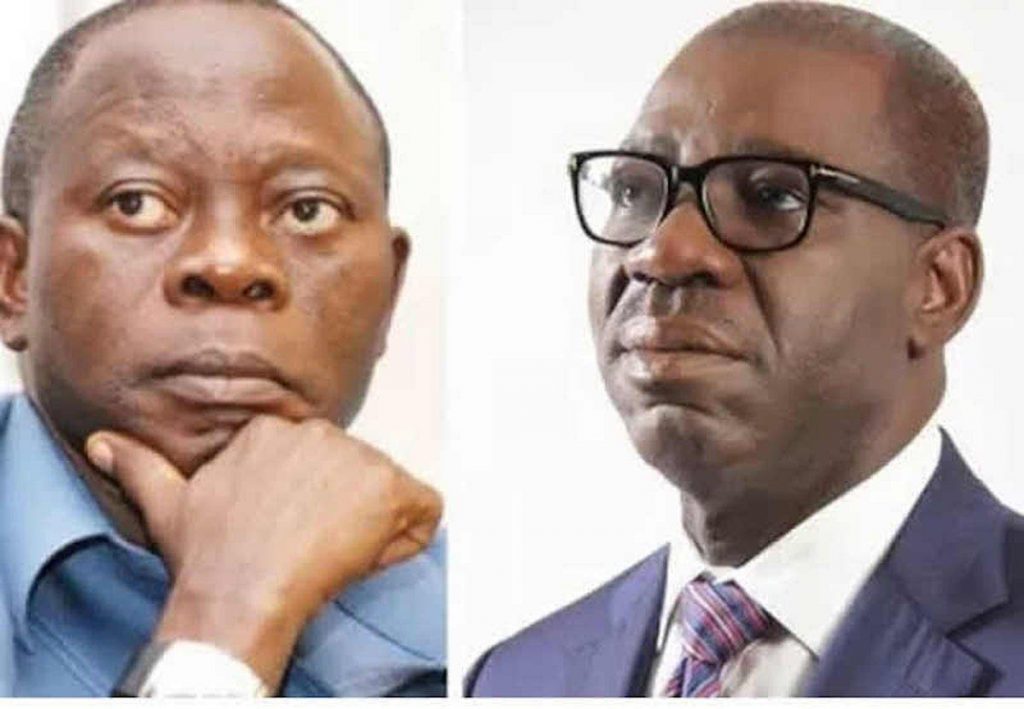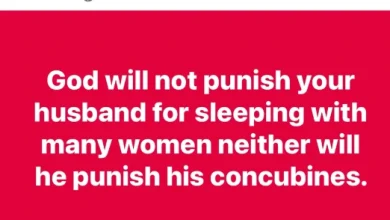DSS Set To Seek Order To Extend Emefiele’s Detention, Lines Up Interrogators
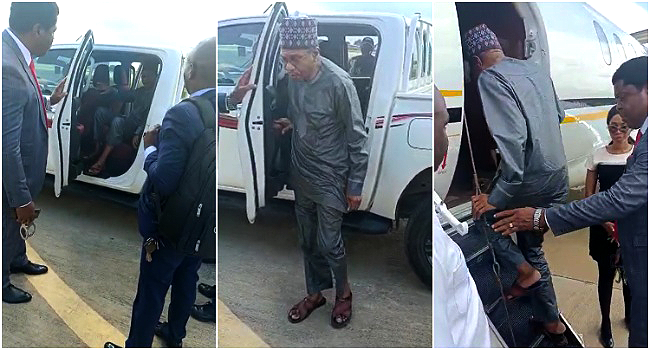
The Department of State Services is likely to approach the court on Tuesday to obtain an order to keep the suspended Governor of the Central Bank of Nigeria, Godwin Emefiele, in its custody for as long as his interrogation will last.
A source in the DSS confided in one of our correspondents that the secret police would likely approach the court to obtain an order to detain the suspended CBN boss for an indefinite period to allow for unfettered interrogation.
President Bola Tinubu had on Friday suspended Emefiele from office with immediate effect.
This was sequel to the ongoing investigation of his office and the planned reforms in the financial sector of the economy, according to a statement by the Director of Information, Office of the Secretary to the Government of the Federation, Willie Bassey.
According to the statement, Emefiele was directed to immediately hand over the affairs of his office to the Deputy Governor (Operations Directorate), Mr Folashodun Adebisi Shonubi, who will act as the CBN governor pending the conclusion of the investigation and the reforms.
The suspended apex bank boss was arrested in Lagos on Saturday by DSS operatives and flown to Abuja in a private jet.
A viral video showed the suspended apex bank boss driven to the tarmac in an unmarked Hilux van accompanied by security agents. After disembarking from the vehicle, he was escorted into a waiting plane where security operatives were waiting to receive him. One of the operatives, who closely followed Emefiele, had in his hands a pair of handcuffs.
The source stated, “He (Emefiele) is going to be with us for some time. We may obtain a court order to further detain him. The previous charges against him are there and further investigations may add to that. You know that he is a big man, and we have to make sure that the loose ends are tightened before we take him to court.
“Recall that we were looking for him before his suspension. Now that we have him, we will hear from him; hear what he has to say on those issues we have highlighted before.”
The source added that the DSS had assembled a team of crack interrogators to quiz Emefiele on wide ranging issues, including alleged terrorism financing and mismanagement of the economy and the apex bank.
“We have a team of interrogators, who are going to quiz and obtain statements from him. We won’t bungle our case. But honestly, Nigerians need to know what happened and why we were looking for him the other time,” the source added.
Meanwhile, Emefiele’s arrest is a precursor to the imminent purge of the top echelon of the apex bank, Sunday PUNCH has learnt.
It was gathered on Saturday that other top directors of the CBN would be interrogated in the coming weeks as part of a comprehensive probe of Emefiele’s administration as directed by the President.
Dependable sources said the secret police would likely go after senior officials in the procurement department of the CBN as well as special advisers to the embattled governor.
A source stated, “One of those under the radar of the DSS is a special adviser to the CBN governor.
“He retired from the CBN in 2021 as a director but was retained by Emefiele as a special adviser. He is believed to have an inside knowledge of all the actions taken by Emefiele.
“Other subjects of interest are senior officials and directors in the procurement department. The fact is that many top directors will be invited or arrested for questioning in the weeks ahead.”
One of our correspondents learnt that Emefiele, his aides and other top directors would be grilled on a number of issues relating to loans worth billions of naira given to farmers under the Fadama scheme, which were believed to have been marred by fraud; the controversial sale of Polaris Bank, which was also allegedly fraught with irregularities; alleged financing of the Indigenous People of Biafra by the suspended CBN boss, and other allegations bordering on forex fraud.
The CBN chiefs are also expected to answer tough questions on the apex bank’s fiscal policies, including the handling of the naira redesign policy, which led to the scarcity of naira notes and caused a nationwide economic crisis, resulting in riots, attacks on banks and death of some citizens.
“Their level of complicity will determine if they will retain their jobs or face prosecution at the end of investigation,” another source stated.
Earlier on Saturday, the spokesman of the DSS, Dr Peter Afunaya, confirmed that the suspended CBN governor was in the custody of the agency and would undergo interrogation.
He said in a statement, “The Department of State Services (DSS) hereby confirms that Mr Godwin Emefiele, the suspended Governor of the Central Bank of Nigeria (CBN) is now in its custody for some investigative reasons.
“The public, particularly the media, is enjoined to apply utmost caution in the reportage and narratives concerning this.”
This was a follow-up to an earlier statement by Afunaya in which he said Emefiele was not yet in the custody of the secret police.
Home, office deserted
Indications also emerged on Saturday that the DSS might conduct a search on the residence and office of the suspended apex bank governor as part of its investigation.
Another source in the secret police said, “He (Emefiele) has been on the watch list of the service for long, now that he has been arrested, he will be spending the night in custody at our headquarters and may not be released anytime soon. There is also the likelihood of his residence and office being searched in furtherance of the service’s investigation.”
Sunday PUNCH reports that the DSS had been on the trail of the suspended CBN governor and had even approached a High Court of the Federal Capital Territory to arrest him.
But Chief Judge of the Federal High Court, Justice John Tsoho, said the secret police did not provide any concrete evidence to substantiate its claims that Emefiele was involved in terrorism financing and economic crimes.
Among allegations levied against the embattled CBN governor by the DSS are terrorism financing, mismanagement of Nigeria’s social investment programme and the Anchor Borrowers’ Scheme, among others.
Meanwhile, the residence of the suspended CBN boss in the Maitama area of the FCT was deserted on Saturday.
Our correspondents, who were there from noon till around 3pm, did not observe the presence of security operatives around his residence. Also, no movement of persons or vehicles was observed in the compound.
At the CBN headquarters, our correspondents only observed the presence of the apex bank’s security men.
This was contrary to what happened earlier in the year when a team of policemen was seen at his home. Also, his office was not spared as there were reports of operatives of the Department of State Services invasion of the CBN.
Naira loses 76% value under Emefiele
The naira has lost about 76.17 per cent of its value since June 2014 when the suspended Governor of the Central Bank of Nigeria, Godwin Emefiele, took office, according to findings by Sunday PUNCH.
It was observed that the naira official rate compared to the US dollar had fallen from N164 to N462.4 (or 64.53 per cent) since June 2014.
Within the same timeframe, the naira has weakened from $1/N183 to $1/N768 in the parallel market.
This also indicates the currency has suffered 76.17 per cent depreciation since 2014 under Emefiele.
Although he was appointed by former President Goodluck Jonathan in February 2014 after the suspension of Lamido Sanusi, his predecessor, Emefiele officially assumed duty in June of that year.
He was re-appointed for a second term of five years in 2022 by the immediate past President, Muhammadu Buhari.
Sunday PUNCH further observed that the naira lost significant value under Emefiele than most CBN governors since 1999.
In July last year, the Senate resolved to summon the CBN governor to educate and inform senators in a closed-session on the reasons for the rapid depreciation in the value of the naira against foreign currencies.
It also mandated its Committee on Banking, Insurance and Other Financial Institutions to assess the impact of the CBN intervention funds meant to support critical sectors of the economy
The resolutions were reached by lawmakers after the upper chamber considered a motion sponsored by Senator Olubunmi Adetunmbi.
A breakdown of how the currency moved under each CBN governor showed that under Joseph Sanusi, the naira-to-dollar exchange rate moved from N99 to N132. Joseph Sanusi spent five years at the helm of the apex bank between 1999 and 2004.
Under Chukwuma Soludo (2004-2009), the dollar exchange rate moved from N133 to N147, while under Lamido Sanusi (June 2009-February 2014), the dollar exchange rate moved from N148 to N157.
Under Emefiele, the value of the naira to the dollar weakened significantly despite efforts to ensure stability by the CBN.
In a bid to manage the value of the naira, the CBN introduced a number of policies, such as stopping forex supply to importers of 41 items that could be produced locally, offering N5 for every $1 remitted to Nigeria through Internal Money Transfer Organisations, and banning the supply of forex to Bureaux De Change, among others.
Specifically, in March 2021, the bank introduced the ‘Naira 4 Dollar Scheme’, intended to boost the inflow of Diaspora remittances into the country. This programme works by paying Diaspora remittance recipients an incentive of N5 for every $1 received through a licensed IMT operator.
In May 2021, the CBN adopted the NAFEX rate as the benchmark rate. This initiative simply meant that rather than having multiple official rates (e.g. CBN rate at N379/$ vs. IEFX rate of N410/$ at the time), the bank simply decided to reduce the number of official rates.
In July 2021, the CBN announced the discontinuation of foreign exchange sales to BDC operators. Emefiele alleged that some BDCs’ actions contravened the agreement with the apex bank by seeking to maximise profits, which he deemed excessive.
In February 2022, the CBN extended the naira for dollar scheme from the IMTOs to the IEFX window.
Specifically, the CBN released instructions that outline that it would facilitate the payment of N65 for every US dollar repatriated and sold at the Investors and Exporters’ Window.
However, these policies have not been able to maintain naira stability.
The World Bank disagreed with the CBN on how it tried to achieve price stabilisation of the naira, adding that the currency should be allowed to respond to real pressures and not be bottled up by the apex bank.
It added that the country’s exchange rate strategy was discouraging investors and increasing inflation.
A Global Finance Report also said that the CBN had failed to curb rising inflation and stop the naira from sliding against the US dollar.
The World Bank in its Africa’s Pulse report for April 2023 noted that the naira lost 10.2 per cent of its value in 2022.
This came as rising food and fuel prices spiked high inflation in the country in 2022.
Economists give opinions
A professor of Economics at the Olabisi Onabanjo University, Ago-Iwoye, Ogun State, Prof Sheriffdeen Tella, said there were certain political and economic issues triggering naira devaluation.
On the economic issue, he said the increase in imports over exports and illicit capital flow were major reasons for naira depreciation.
He said, “The devaluation is caused by both political and economic issues. The economic issue is that we continue to import goods and we are not exporting much beyond oil. Also, the non-oil sector is not doing very well, and we are still importing more.
“There is also the issue of illicit capital flow. That is, people taking foreign currencies without caution. The coronavirus pandemic has also affected output.”
On the political issue, he explained that the CBN had been intentionally devaluing the naira in order to increase the funds given to state governments.
Tella added, “On political grounds, the CBN, probably with collusion from the Ministry of Finance, has been devaluing the value of the naira officially to increase the amount of naira given to state governments.
“The official devaluation of the naira has taken place twice, and that is a political thing. They are doing it to satisfy fiscal expenditures.”
He urged the government to address these issues to achieve naira appreciation.
A professor of Economics and Public Policy at the University of Uyo and Chairman, Foundation for Economic Research and Training, Prof. Akpan Ekpo, condemned the intentional devaluation of the naira by the CBN.
“When you devalue, you are hoping that the goods you export will be cheaper; you can export more and earn more revenue. However, our major export is crude petroleum, and we don’t control the price or output. So, we don’t get anything from the government’s outright devaluation,” he said.
Ekpo urged the government to boost production and ensure that the country had a strong and productive economy.
He stated, “The only way we can stop the devaluation of currency is production. We need to produce more goods and services, and export them to earn foreign exchange. That is our basic problem in Nigeria; we consume what we don’t produce.
“The government needs to build an economy that is strong and doesn’t rely on one commodity.”
A former President of the World Bank Group, David Malpass, recently warned that Nigeria’s parallel exchange rate was harmful as it would worsen future debt service payments and increase the risk of debt distress.
Malpass said this in a blog post titled, ‘Parallel Exchange Rates: The World Bank’s Approach to Helping People in Developing Countries’, published on the bank’s website.
According to Malpass, about 24 emerging and developing economies, including Nigeria, have an active parallel currency market.
“In at least 14 of them, the exchange rate premium—the difference between the official and the parallel rate— is a material problem, exceeding 10 per cent,” he added.
In the blog post, it was disclosed that Nigeria had an exchange rate premium of 61.7 per cent as of March 2023.
The World Bank chief noted that parallel exchange rates were expensive and could drive corruption.

